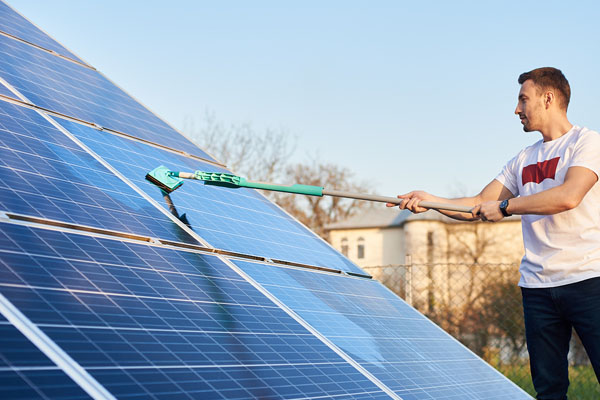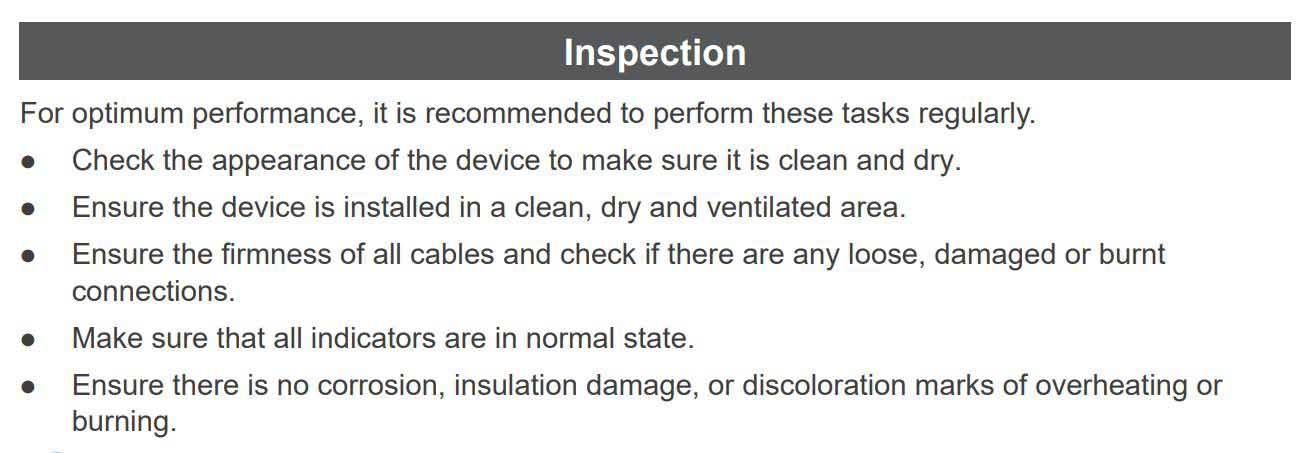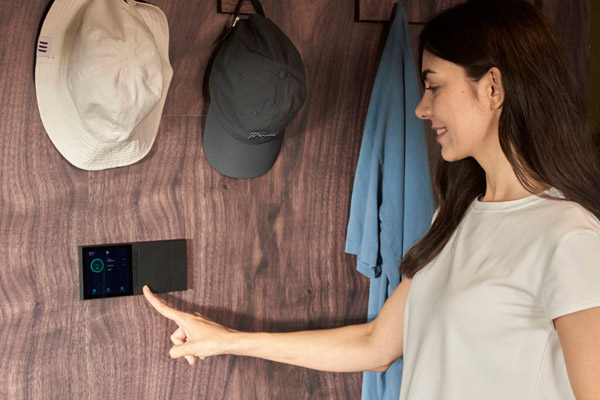Solar Panel Maintenance Guide: Practices, Cost, and Frequency
Maintaining solar panels in a hot, dry place like Nevada is relatively easy: You dust them off, polish them up once a year, and only check in on them if there’s a malfunction.
But in a colder, damper place like Canada, solar panel cleaning and maintenance is a much more nuanced, and much more important, task. If you want your solar panels to operate at peak efficiency, there’s a few things you should check on a regular basis.
So let’s dive into the world of solar panel cleaning and maintenance, so that you can be assured that you’re getting the most out of your investment.
In this article, we will cover the following topics:
- Do Solar Panels Need A Lot Of Maintenance?
- How Do I Maintain My Solar System?
- Should I Get Solar Panel Cleaning By Professionals?
- Digital Monitoring As Part of Solar Panel Maintenance
- Uninvited Guests
- On The Go
- If You Need Help With Solar Panel Cleaning Questions
Do Solar Panels Need A Lot Of Maintenance?
In general, solar panels are fairly self sufficient. We’re going to be presenting a series of checks you should perform and habits that you should maintain, but 90% of the time solar panels take care of themself. You just don’t want to be caught off guard the other 10% of the time.
How often do solar panels need maintenance?
The good news: For simple solar panels (non-tracking), there are no moving parts. There’s no fluids to check or top up. You won’t need an external yearly service, since the checks you need to perform can normally be done with a visual scan and an analysis of your energy production. But if you do need external maintenance service, most online solar panel cleaning service teams recommend the interval should be every one or two years.
How much does it cost to maintain solar panels?
The prices range from one hundred and fifty dollars to several hundred dollars. There are many professional cleaning companies available in Canada. You can ask them for quotations and compare them carefully.
By and large, cleaning solar panels in certain severe conditions will be your main task.

How Do I Maintain My Solar System?
Maintaining your solar system is fairly simple, requiring no particular training. The things you might need include:
● A soft bristle brush on a broom handle.
● A ladder.
● A working hose.
● Gentle dish soap.
● A bucket.
● And if you ever have to get on the roof, a safety harness if one is available.
Once a year you should do a visual inspection of your solar panels, whether or not you’ve seen a drop in production year-on-year. This is to make sure there are no obvious problems: Deep dents or cracks, foreign obstructions, fallen branches, scorch marks, bird nests, and the like.You may check out this document for the detailed process of an inspection.

When it comes to cleaning the solar panels, you may follow the steps below:
1. Unplug all the cables connecting to the panels in case of any possible electricity shocks;
2. Use a dry cloth to clean the housing of the panels and connector contacts. When confronted with stubborn stains, you may use household cleaners;
3. Let the devices dry completely prior to the reconnection;
4. Make sure the reconnections follow the steps in the devices’ user manual.
As a rule of thumb, never spray water on your panels during midday heat or freezing temperatures. The sudden change in heat level might crack the panels.
Speaking of birds, one of the enemies of solar panels is bird waste. This is why you might need a bucket of soapy water and a soft bristle brush: To clean bird guano from the panels. After you soap and scrub the panel gently, hose it off with fresh water and it should be fine.
As part of your visual analysis, check the brackets. if you see excessive rust, parts in disrepair, panels sagging or sliding off their mounting, or anything out of the ordinary, you should have it corrected or repaired.
That is the sum total of your yearly solar panel cleaning and maintenance. Now let’s talk about seasonal issues that might arise.
During the winter, if there was extra thick snowfall (several inches overnight for example), the solar panel might have issues burning through such deep cover. You should use your brush to clear them off. For light snow or rain this isn’t required, because the panel will burn right through such minor inconveniences. If you need to use water to clean your panels, never heat it or boil it. Room temperature is fine. Anything more could crack the glass.
If you live in a dusty area, you might need to periodically hose the panels off, particularly during the summer. Believe it or not, a thin layer of dust can be more obstructive than several inches of snow. The same goes for ash or other fine particulates that can cling to smooth glass surfaces. The more tilted your solar panels, the less dust and grime will stick to it. But you don’t determine the solar panel’s angle, your latitude does (they’re tilted to catch an optimal amount of sunlight during peak hours), so you’ll have to live with this particular task.

During the fall, glance up at your panels periodically to make sure they aren’t covered in pine needles, leaves, or twigs. This will result in a large drop in productivity, so it should be fairly obvious if you’re paying attention to daily output.
Should I Get Solar Panel Cleaning By Professionals?
It is rarely worthwhile to get an external service for solar panel cleaning, unless you own an entire multi-acre array.
One study on solar panel cleaning made by the engineers at UC San Diego discovered that solar panels left entirely dry only lost 7% efficiency in six months. That was in dusty condition, with no rain, no cleaning or hosing off, and no brushing.
Given how easy it is for most people to just hose their panels off if they get particularly dirty, professional solar panel cleaning is pretty much a waste of money.

Digital Monitoring As Part of Solar Panel Maintenance
This is where you can do the most good, rather than up on a ladder or teetering around on your roof. Checking out your solar panel efficiency by checking out theoverall energy output regularly is how you can really tell if something is impacting their performance.
Your app or monitoring system, for example, Renogy DC home App or Renogy One, should be able to report overall production figures, PV Voltage, PV currents, and so forth.If your year-on-year production is significantly down (comparing January of last year to January of this year, for example) despite clear days and the same number of peak sun hours, there might be a problem.
Use the techniques above to check for blockages, dirt, stains, or a large buildup of ice and snow. If that’s the cause of the issue, it can be easily resolved. But if they’re clean and properly angled, and yet still report massive inefficiency, that’s legitimately odd.
If your panels are under warranty when you note these oddities, and you’ve made sure they’re clean and clear, it’s time to report them to your installer or panel insurer. Yes, panels will lose effectiveness over time, but many panels these days will get over 90% efficiency for at least 10 years, and slowly drop off after that.
How efficient are solar panels? Click here for more.

Uninvited Guests
It’s possible that the natural world is being unkind to your solar panels, in ways that you might not have expected.
Besides the bird nests and guano that we’ve mentioned already, a number of creatures or pests can impact your solar operations. Termites can eat away at the underlying roof and change the array’s angle as it sags. Rats and mice can nibble at the cables. Other flying creatures, from bugs to bats, might make homes in or around the array or otherwise leave their mark. Natural growths like ivy, fungus, and mushrooms may impede operations.
If this is the case, you’ll need to clear out the pests and then reinforce and protect your house and roof as appropriate. Installers can put up critter protection - grids or meshes that keep small animals out and away from the panels.
Equally important is attic maintenance, particularly if you have solar equipment up there. Pests gnawing away at things in and around your box, wires, fuses, or data lines can impact both your ability to monitor your solar production and the system itself. If you have gear in the attic, it too deserves a visual inspection once per year at minimum. Also look for any signs of rusting, sagging, charring, or arcing… if you see strange discoloration on your gear, get a picture and send it to your installer for an opinion immediately.
On The Go
If you have solar panels mounted to your RV, camper, or boat, there are a couple of additional things to look for.
If you see loose connections, and you know how to fix them, you should do so. If you need help, ask someone in the know!
Cleaning is the same as stated above, with the additional concern of salt build up. Salt from ocean mist can cake on your solar panels, so make sure to rinse them off with fresh water if you see that happening. Similarly, salt from road treatment can kick up and coat RV solar panels. Cleaning them is imperative if you want full efficiency.
Flexible panels should be examined for odd cracks and dings. They will still function with minor cracks, but over bending and bad storage habits need to be avoided.
Like any other panels, if there are stains on the surface, flexible solar panels aren’t going to work properly. Clean them as noted above, though you might need to spend a little more time gently scrubbing away things like tree sap.
If You Need Help With Solar Panel Cleaning Questions
Renogy Canada can help you to answer any of your solar panel cleaning or efficiency questions. Feel free to contact us and we’ll get back to you as soon as possible. In addition, whether you need more solar panels to expand you existing PV system or want to replace your old, malfunctioning charge controller or inverter, Renogy always has reliable and affordable options for you, such as monocrystalline solar panels, MPPT/PWM charge controllers, pure sine wave inverters, and 12V lithium batteries, and more.
Related articles:
RV Solar Panels: The Definitive Cheat Sheet
Do Solar Panels Work In The Shade?
How Do Solar Panels Work: Things You Should Know






